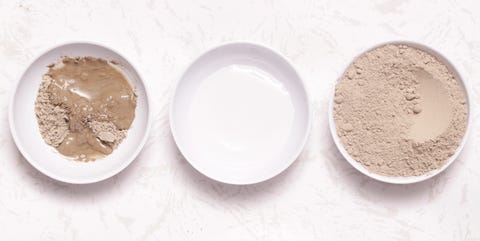This mineral-rich clay stars in oil-absorbing face masks—here are the ones worth trying.
There’s nothing better than a relaxing Sunday night with your favorite dinner, Netflix show, and face mask—which can help hydrate your skin, minimize breakouts, and simply leave you feeling refreshed for the week ahead.
While salicylic acid and benzoyl peroxide are top-notch pimples fighters, your favorite acne-fighting masks might also include an ingredient called bentonite clay. There are big skin-clearing promises surrounding this mineral-rich skincare ingredient—but what can it really do? And is every form of this clay safe to use?
We talked to a dermatologist and esthetician to find out what bentonite clay is, how it benefits the skin, any risks it comes with, and the best way to add it to your at-home pamper routine.
What is bentonite clay?
“Bentonite clay is an absorbent aluminum silicate formed from volcanic ash that’s been used for centuries to detoxify and heal the skin and body,” says Amy McLain, master esthetician at Kenneth’s Hair Salons & Day Spas in Columbus, Ohio. That simply means it’s a mineral-rich clay that has the ability to absorb substances it comes in contact with. It’s also anti-inflammatory, making it especially soothing on the skin.
Bentonite clay also has an interesting history as a medical treatment, says Cybele Fishman, MD, an integrative board-certified dermatologist in New York City. She explains that the clay has been used in two surprising ways, including in pigs to reduce their exposure to a certain mold that contaminates their food and in Ghana for the topical treatment of Buruli ulcer, a bacterial infection of the skin (and bone) that can lead to disability.
So what does bentonite clay do for the skin, exactly?
Bentonite is found both in skincare products and as a powder that you can buy and mix into a mask-like treatment at home. As with any trendy ingredient, the clay has been hyped as a cure-all for a vast number of skin ailments. It’s been used to treat certain skin issues, like diaper rash, as well as rashes from poison ivy, poison oak, and other irritants, according to one 2017 review of research.
Many people suggest using it to “cure” eczema or psoriasis, but it’s best to consult a board-certified dermatologist for these conditions, since he or she can talk to you about lifestyle recommendations (such as managing triggers, like stress) and prescribe more effective treatments.
That said, there is one place where bentonite clay shines: It sops up excess oil in people who have acne-prone skin. “It absorbs sebum and is good for those with oily skin,” says Dr. Fishman. That’s a big deal, since overproduction of sebum (that lovely oily, waxy substance your oil glands release) is a major cause of clogged pores and acne breakouts.
Where can I buy bentonite clay?
You’ll most often find bentonite clay as a star or supporting ingredient in face masks. If you struggle with acne, try applying a bentonite clay mask once or twice a week for 10 minutes, recommends Dr. Fishman. Here are a a few expert-approved products worth trying if you tend to get oily.
How to make a DIY bentonite clay mask
One powder form worth trying? Aztec Secret’s Indian Healing Clay, which has a cult following (more than 14,000 reviews on Amazon with a 4.4 star rating). You can mix the powder with water, but apple cider vinegar is recommended to deeply cleanse, minimize pores, and fight breakouts. Because it’s quite potent, try testing a patch of skin to see how you personally react to the product.
Is bentonite clay safe to ingest?
There are bentonite clay products that can be taken internally (via capsules or a powder you mix with liquid and drink) to “detox the body.” Spoiler: Your liver and kidneys already do that for you by breaking down toxins and flushing them from your system.
For example, one supplement maker suggests that ingesting the clay will absorb potentially harmful substances (like herbicides or toxins), helping to ferry them out of your body.
“While sources claim it detoxifies heavy metals, bentonite clay can also be contaminated with heavy metals. I do not recommend ingesting it,” says Dr. Fishman. What’s more, supplements are not FDA-regulated, meaning it’s difficult to know if what you’re consuming is safe. So while they make big claims and are easily available for purchase, just don’t do it.



























